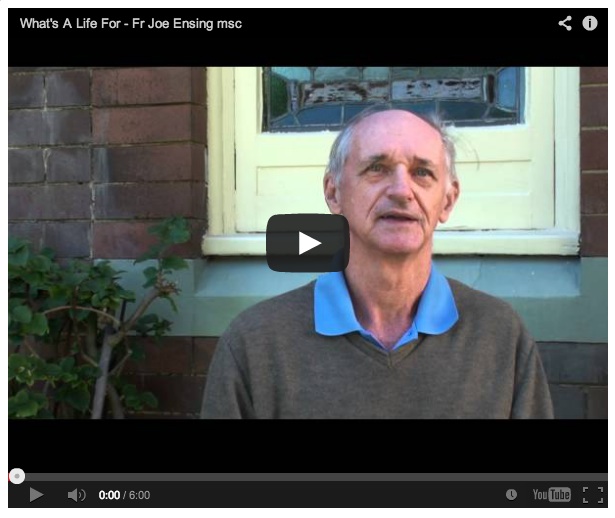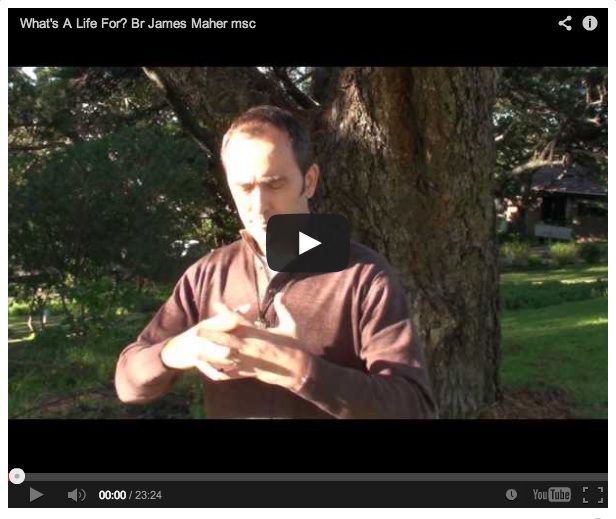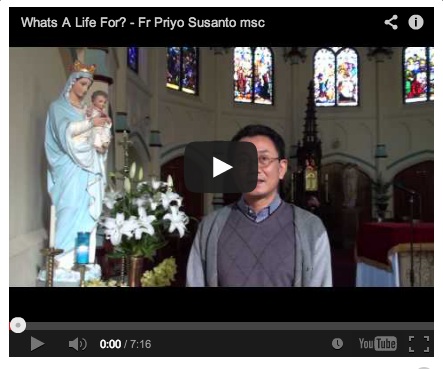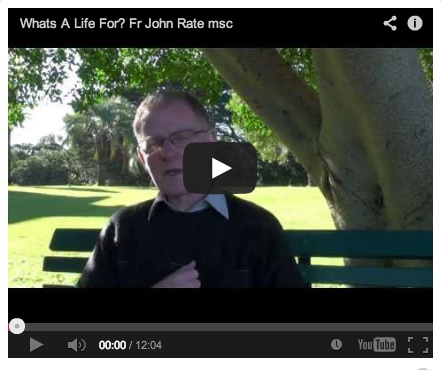MSC life stories
LIFE STORY: DENNIS MURPHY MSC
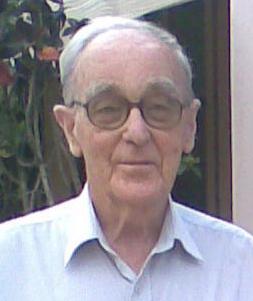
Requiem Mass for FATHER DENNIS MURPHY msc: Eulogy by Fr. Malcolm Fyfe msc
Dear Friends, we have come together this morning to commend Father Dennis Murphy's soul to God, in the presence of his mortal remains, brought back to Australia for burial, after a well-attended Requiem Mass in Bangalore, at the request of his sister, Catherine, and other members of the family. We welcome all of you here for this Requiem Mass and we offer Dennis' relatives and friends our condolences and our union with them in prayer.
Today at this Mass, we want to celebrate the quite exceptional achievements of Father Dennis's life. And we are doing this in association with the liturgy of the Eucharist to which he was deeply devoted. Let me add that it will not be possible to do complete justice to Father Dennis's multilayered life-story and achievements: I can only endeavour to comment selectively on certain aspects presented from just one person's point of view. Last night at the Sharing of Memories you heard tributes offered by so many others who were touched by his life.
As Christians, our belief in what happens to us when our life on this earth comes to an end is supported by an array of Biblical texts. St Paul, for example, in his Letter to the Romans (Chapter 8) states: "If the Spirit of him who raised Jesus from the dead has made his home in you, then he who raised Christ Jesus from the dead will give life to your own mortal bodies, through his spirit living in you."
Again, St Paul's words in the Second Letter to Timothy (Chapter 4) provide a similar testimony when St Paul's own life was drawing to a close: "The time of my departure has come. I have fought the good fight, I have finished the race, I have kept the faith. Henceforth there is laid up for me the crown of righteousness, which the Lord, the righteous judge, will award to me on that Day, and not only to me but also to all who have longed for his appearing." With all his down to earth humility, I believe Father Dennis could well have used those words of St Paul: "The time of my departure has come. I have fought the good fight, I have finished the race, I have kept the faith. Henceforth there is laid up for me the crown of righteousness".
The victory of Jesus over death and sin is the model and pattern of our own destiny. We too, are to pass through death to life in Christ Jesus and see God face to face for all eternity. And so, the sorrow and sense of loss that we naturally experience at the death of someone we have admired and esteemed, give way to a celebration of his personal gifts and of all that he achieved throughout a long and dedicated life. We will thank God for these achievements and for the privilege of having known him.
Father Dennis was called to eternal life on Monday of last week. He was 87 years of age, having been born on April 20th, 1927, at Maroubra. He grew up with a love of the sea and was a keen and competent body surfer. His father James, was a policeman and his mother Teresa, lived into her nineties. Dennis attended primary school at St. Anthony's, Clovelly and his secondary schooling consisted of one year at Christian Brothers College, Waverley, followed by four years at our Sacred Heart Apostolic School in Douglas Park. Needless to say, he was a very bright student.
A year's Pre-Novitiate or Postulancy, as it was then called, followed and afterwards came the Novitiate, with Fr Cuthbert Hoy as a very exacting Novice Master. In 1949, after Final Vows, he was selected to go to Rome, where he gained successively his Licentiate of Sacred Theology and his Licentiate of Sacred Scripture. These studies enabled him to get a good grasp of several languages including Italian and French, with the ability to read other languages such as Biblical Greek and Hebrew. While still busy with his Scripture Studies, Dennis was ordained in Rome on December 22, 1951, somewhat ahead of his fellow seminarians back in Australia. Indicative of that era was the mild scandal Dennis caused back in the Australian province by a photograph showing him digging at a biblical site alongside a female archaeologist who was only lightly clad because of the summer heat.
It was on Dennis's return to Australia in September 1956 that I first met him. During that year, as a sort of gap year between our Philosophy and Theology studies, Father Noel Mansfield and I taught at Douglas Park Apostolic School. The addition to the teaching staff for the final term of the academic year of a cheerful and iconoclastic Dennis Murphy was a breath of fresh air to what had been a confining and stuffy routine. Shortly after he had been given some duties at the Apostolic School, I paid a visit to his room and was surprised to find him seated behind a large desk that had absolutely nothing on it. I asked him didn't he have anything to do and his answer was that he was busy purifying his intention.
At the start of the following year Noel Mansfield and I followed Dennis down to Croydon Monastery where we enjoyed 4 years of Scripture Studies from a 'guru' who had been intellectually liberated by the exegetical insights that followed on Pope Pius XII's ground-breaking encyclical "Divino afflante Spiritu" which the eminent bible scholar Raymond Brown would later describe as a 'Magna Carta for biblical progress'.
Interestingly enough, to use the simplistic division of theologians into the two categories, liberal and conservative, the Dennis Murphy of those days was quite liberal in his theological outlook. I believe with the passing of the years he moved quite distinctly to a more conservative hermeneutic, both in doctrinal matters and in religious praxis.
However, back in those early days, for 11 years, Dennis taught an up to date Scriptural theology and the languages of the Bible at Croydon Monastery. Subsequently, he never lost his interest in and love for Sacred Scripture and in its correct interpretation. I am sure he could have made a noteworthy career as a Scripture Scholar, but being a multitalented person meant he had to forego some possibilities in order to advance other options, ones that in his view had a higher priority. As it was, Dennis authored several books on Scriptural topics, as well as others dealing with our MSC charism and mission and the meaning of a Spirituality of the Heart.
In 1969, at the end of his 11 years teaching at Croydon, he transferred to St Paul's Late Vocation Seminary, where he was successively Lecturer for a year, Acting Rector the following year and then Rector for four years.
At the Provincial Chapter held late 1974, he was elected Provincial Superior. As Provincial he concerned himself with the welfare of the province's members in a very personable way, consulted widely and interested himself in our overseas Missions, with a special concern for our priests and brothers in Japan, Papua New Guinea and the Pacific Islands. He also had a special concern for MSCs working in the Northern Territory and for the wellbeing and overall development of Aborigines.
Dennis's 6 years as provincial from 1975 to 1980 witnessed great changes in the Church's outreach to the Indigenous. Halfway through that period Dennis asked me to go to the Top End. The Mission era was coming to a close and the Government espoused an approach of self-determination. Our Northern Territory Missionaries had traditionally been self-reliant men of grit and perseverance, with practical skills for pastoral work on remote aboriginal settlements and the capacity to endure isolation and a exacting lifestyle. The environment was challenging and outside support very limited. Dennis hoped for teamwork and a more unified approach.
In 1978, halfway through his six year term, Dennis oversaw the shifting of the Provincialate from Kensington Monastery to where it now is, at Treand House in Coogee.
After his term of office as Provincial finished, Dennis began 1981 as Parish Priest of Alice Springs. At the time I was the Religious Superior for the Northern Territory. Later that same year Dennis went to Rome as an Australian participant at the General Chapter and was himself elected as one of the General Councillors to the newly elected Father General, Cornelis Brown. This role was to last for 12 years. Dennis was a most trusted advisor of Kees Braun and both of them felt strongly that Missionaries of the Sacred Heart should be present in India. I was initially asked to spend some time in India, meeting Bishops and Provincials and after surveying the overall situation to draw up a comprehensive report for the General Conference held at Maracaibo in Venezuela late 1983. By this time both Kees Braun and Dennis were committed to the MSCs becoming established in India and as a consequence I spent the following 17 years there.
This is not the place to give a historical summary of the formation of the Indian branch of the Missionaries of the Sacred Heart. However its history and Dennis's story would eventually become entwined because ten years later, after finishing up in Rome, Dennis elected to go to India, where he ended up spending the next 20 years. Dennis' time in India and my time there had an overlapping period of nearly 10 years.
During his time in India, Dennis engaged in research into the voluminous writings of our Congregation's Founder, Father Jules Chevalier and endeavoured to communicate our Founder's message to our Indian seminarians. Later his research included further Scripture study, and when MSC India was marking its first quarter century, he wrote a history of the founding of the Indian Union itself. Up till now, however, this has not been published.
During the 3 years 2001 to 2004 he was Superior of the Formation House and Director of Students. For the following 4 years he was Spiritual Director for all our students on their way to priesthood.
Dennis led by example as much as by instruction. His was a piety of devotions: to the Sacred Heart, the Eucharist, Our Lady of the Sacred Heart and to St Joseph. He felt that in many parts of the post-Vatican II Church, when people gave up the practice of traditional devotions, such as for example, Benediction of the Blessed Sacrament, they lost their interest in and commitment to the faith. Dennis also endeavoured to inculcate a simplicity of life and the practice of evangelical poverty, again by example. In this he followed Mahatma Gandhi's principle that we shouldn't ask others to do what we are not prepared to do ourselves. In this as in other regards, not all the disciples were able to imitate the Master.
With Dennis's passing, the Missionaries of the Sacred Heart have lost an iconic personality, a very gifted but simple man of God, a person greatly revered by the worldwide Congregation of the Missionaries of the Sacred Heart, dedicated to the best possible formation of so many religious and priests, and in these last 20 years, much loved by the many seminarians and parishioners who came to know him during his time in India.
During Dennis's later years in India he had more than one close brush with death. I remember one morning when I came across him, his face an ashen grey colour. He had had a cardiac episode during the night but didn't want to disturb anyone. We rushed him to the nearest hospital where the doctors told me he had only a few hours to live. But Dennis lived another 15 years.
A few weeks before Easter this year Dennis had a fall, which he tended to make light of. Cellulitis ensued and one thing led to another. The last time I had a telephone conversation with him was during Holy Week. A few days later, on Holy Saturday, he was admitted to St John's Medical College Hospital. St John's is a Catholic Hospital under the aegis of the Indian Bishops' Conference. It averages about 5,000 outpatients per day. It is situated about six kilometres from our parish and main formation house in Bangalore, but because of the traffic, getting there by car can sometimes be not much quicker that by walking.
Whatever about that, Dennis was transferred to the Intensive Care Unit a week after Easter. When it seemed he had only a few days of life left to him, I went across from Darwin to accompany him during what was expected to be those final days. At best, he could only recognize people, smile occasionally and hear what they were saying. He was unable to speak. Often he was not conscious and not in a position to communicate whether he wanted treatment to continue. The doctors were committed to doing everything they could to stabilize him but the 5 weeks in Intensive Care ultimately saw him deteriorate to the point of no return.
The Indian Missionaries of the Sacred Heart want to pay tribute to the doctors and staff at the St John's Hospital for the care and attention they showed Father Dennis throughout his illness. And I would like to acknowledge the practical concern, the unwavering care and affection that the MSC Community in Bangalore displayed towards Fr Dennis throughout his ordeal. During those final 6 weeks, there was always an MSC confrere in attendance at the hospital, night and day.
The MSC Union of India has asked me to pass on their condolences to the Australian Province. And, as I said earlier, we extend our condolences to Dennis's sister Catherine, to his nephews, nieces and other relatives present here today.
As we continue to celebrate the Eucharist this morning, thanking God for Father Dennis's life and achievements, we should remind ourselves of those words of Jesus that we heard this morning from the St John's Gospel: "I am the bread of life – he who comes to me shall not perish. He who believes in me, even if he dies, he shall live forever. He who eats my flesh and drinks my blood has eternal life and I will raise him up on the last day".
Father Dennis had a special devotion to the presence of Jesus in the Eucharist. At his prompting, the Taizé-style hymn, "O Sacrament most holy, O Sacrament divine, all praise and all thanksgiving be every moment thine" is heard many times a day like a mantra at the Our Lady of the Sacred Heart Church and Formation House over there.
And Dennis had another favourite hymn. As a result of his urging, one now hears it at the end of Sunday Masses at Our Lady of the Sacred Heart Church in Bangalore. It is a rendition of the beautiful prayer called the Anima Christi, addressed to Christ in the Eucharist. It begins with the words:
Soul of Christ, sanctify me
Body of Christ, save me
Blood of Christ, inebriate me
Water from Christ's side, wash me
Passion of Christ, strengthen me.
Then looking ahead to the fragility and mortality of the life of each one of us, it continues:
O good Jesus, hear me...
In the hour of my death call me
And bid me come unto You
That with your Saints I may praise You
Forever and ever, Amen.
"In the hour of my death call me and bid me come unto You."
In the hour of Father Dennis's death, we can believe that it was Jesus who called him and bade him to come to Him, so that with all the Saints he could be with God and praise Him forever.
And so, we can be sure that Father Dennis, who was so faithful to the teaching of Christ and his Mission, so devoted to the presence of Jesus in the Eucharist and to his Mother Mary, under the title of Our Lady of the Sacred Heart, is already enjoying everlasting life, peace and light in the Kingdom of God.
LIFE STORY: BISHOP TED COLLINS MSC
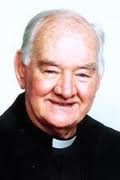
SOMETHING BETTER: Edmund 'Ted' Collins answered a call to "something better"
By Damir Govorcin, Published in 2003.
Why did Ted Collins toss in a promising career in the NSW police force to join the priesthood? Well, says Ted, now the Bishop of Darwin: "It was like indigestion ... the idea kept coming back up".
The bishop's trademark sense of humour and easygoing nature have made him a much-loved figure in NSW, South Australia and the Northern Territory over the past 40 years.
This year, to mark the 40th anniversary of his ordination, celebrations were organised at St Mary's Cathedral in Darwin and at his former parish in Randwick, where he had two stints as parish priest at Our Lady of the Sacred Heart (1964-67 and 1978-85).
His former parishioners showed their appreciation by packing a function room at Randwick Racecourse for a luncheon and concert to celebrate the life of a man they
call "a true shepherd".
"Bishop Collins is such a wonderful person, and he is greatly missed at Randwick," said parishioner Joan Taylor.
"With his genial disposition, he has overcome many obstacles in his life and I pray that he will spend many more years looking after the Top End."
Bishop Collins says he has been overwhelmed by the love and support he has received over the years, and was delighted to "return home" to Randwick to see so many old friends.
"I spent 12 years at Randwick, so it has a special place in my heart," he says. "It was terrific to see so many familiar faces and I was amazed by the turnout."
Ted Collins, the youngest of five children in an Irish-Catholic family, grew up in Bermagui on the NSW far south coast.
He was a keen sportsman and loved surfing, cricket, golf, rugby league, rugby union and Australian Rules.
"Bermagui was great place to grow up," he says. "There was always plenty to do.
"I was always active and tried my hand at many different
sports.
"I've got nothing but happy memories from my childhood."
There were tough times, though.
He was only five when his mother died, leaving his policeman father the task of raising five children on his own.
"It was a big blow, losing Mum at such a young age," says Bishop Collins.
"It put a lot of pressure on Dad, but he did a great job.
"Just my sister Madge and I are alive."
It was only natural that Bishop Collins would follow in his father's footsteps, joining the police force at the age of 16.
He was based in Sydney for eight years, describing his tenure as a policeman "as some of the happiest times of my life".
"Becoming a policeman was something that was in the blood and it was my way of helping serve the community," he says.
"I saw some gruesome things, but that was part of the job.
"I had happy memories in the police force and I wouldn't have left the job if I wasn't going on to something better.
"I would lock someone up while they were getting sober, but I didn't feel I was helping them enough."
The "something better" that was beckoning him was the priesthood.
And, in July 1963, at the age of 32 he was ordained by Cardinal Gilroy.
Apart from his two stints as parish priest at Randwick, Bishop Collins served in the parishes of Hindmarsh, Adelaide (1968-70), and Nightcliff, Darwin (1971).
He became superior of the Missionaries of the Sacred Heart in the Northern Territory and director of Catholic Missions in the Territory (1972-77) before he was ordained Bishop of Darwin in 1986.
"I always felt drawn to the priesthood," he says. "I wanted to do something better with my life.
"I felt being a priest gave me more of a chance to help someone by getting to know them and helping them with their problems.
"I haven't had any regrets with the choice I made."
Bishop Collins will never forget the night Cyclone Tracy destroyed Darwin in 1974.
He was attending Midnight Mass at St Mary's Cathedral when the cyclone hit on Christmas Eve, smashing everything in its path.
"We were told that the cyclone was going to hit at six on Christmas morning, but by 11.30pm it had hit and it was the most terrifying experience of my life," he recalls.
"I will never forget the roar of the wind ... the lights went out in the cathedral and windows were smashing, with glass all over the place.
"It was a devastating time ... many lives were lost and people's homes were totally destroyed. I didn't get any sleep that night and I said a few decades of the rosary."
Bishop Collins says he was excited to be appointed Bishop of Darwin, but he had a "gut feeling that it was going to happen".
"Before I went on a sabbatical to New Mexico I knew that I was in contention for the position, so it wasn't a shock when I got the job," he says.
"When I got a call in the middle of the night from my provincial to say I was appointed, I didn't think twice about accepting the position."
His reign as bishop hasn't been without controversy.
He campaigned strongly against the Northern Territory Parliament's decision to legalise euthanasia.
The Federal Government overturned the decision, banning euthanasia in the Territory.
"Euthanasia is murder and you can't legalise murder," the bishop says. "I fought tooth and nail, along with many other people, to stop it. "And, thank God, it was banned.
"I have sympathy for people in pain, but it's not the way out. "God will take you when he wants to."
Despite heart bypass surgery a few years ago, the 72-year-old bishop shows no signs of slowing down.
"I went in for back surgery, but then the doctor told me I needed a bypass," he says.
"I can still play golf, but walking long distances can be a struggle."
Asked what he will do in retirement, Bishop Collins says: "Probably play more golf"
LIFE STORY: FR EDWARD McGRATH MSC
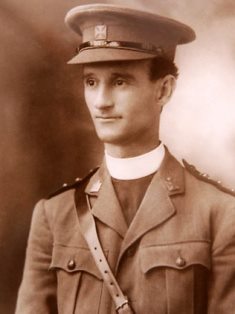
HAD the Great War not ended just weeks after he carried a wounded British officer from a bloody battlefield on the Western Front under heavy fire, Australian Catholic Priest Father Ted McGrath almost certainly would have become a national hero.
He was the the only Australian chaplain from the war to be nominated for the Commonwealth's highest award for valour, the Victoria Cross.
In the dying months of the war to end all wars, Captain McGrath, who stood over six feet tall and therefore made an easy target, was awarded the Military Cross (MC) for "conspicuous gallantry'.
"His coolness and devotion to duty were an inspiration to all ranks".
It was during a British counter-offensive behind the village of Bucquoy near the town of Lens on August 21, 1918, that Captain McGrath, of the Cheshire Regiment and formerly of Bungeet in northeast Victoria, an unarmed army chaplain, went forward repeatedly under heavy machine gun fire to rescue wounded men.
Half of the 600 troops involved in the action were killed or wounded.
A statistic that provides some context to the scale of the losses suffered during the battles of the Somme was that from 25 officers in the regiment who took part in the first day's fighting, just four remained alive two weeks later.
A month later, on September 28, the Cheshires were back in the thick of the action near the village of Beaucamp (Wailly-Beaucamp). Two days earlier, Father Ted had unpacked his portable altar kit and said mass on a temporary altar near a dressing station close to the front line for those about to go into battle.
In his book about Ted McGrath, A Lonely Road, author John Hosie recalls the story about how on the morning of the 28th, Captain McGrath saw an officer brought down with what appeared to be a shot to the stomach. "In another act of outstanding courage the chaplain went an incredible 300 yards out intro no-man's land, lifted him up and carried him back to safety on his shoulders," the book says.
For this act of valour, Father Ted was recommended for the Victoria Cross. The recommendation was made by three officers including the victim himself, Lieutenant C.I. Attewell, a machine gun section commander.
According to Hosie's book, one of the recommending officers, Dr Jeremiah Holland, wrote; "He undoubtedly saved the officer's life, owing to the very exposed position in which he lay and the severity of his abdominal wound. This chaplain has been in the forefront of every attack with the Cheshires since their first advance on August 21.
"The above is only one instance of his devotion to duty, and his readiness to sacrifice himself under the greatest risk and danger to his own life while seeking to bring comfort to others."
About 37,000 Military Crosses were awarded during the Great War. Some 3500 military chaplains served with Imperial forces during the war. It is known that about 121 of 750 Anglican ministers were awarded the MC, an unusually high proportion given their low numbers and the fact that they were officially non-combatants
Three British priests, Edward Mellish, William Addison and Theodore Hardy, were awarded the Victoria Cross during the four-year conflict.
Father McGrath was a controversial figure in the Catholic Church and after the war he was barred by the hierarchy from returning to Australia and his beloved Our Lady's Nurses of the Poor in Dudley Street Coogee - which he had established with Eileen O'Connor in 1913 - for another 23 years.
He was parish priest when he met the young woman and they were both determined to do something to help the poor of the district. Another priest had reported to the church bosses that Father Ted and Ms O'Connor had an inappropriate relationship and despite the charge being false, he was banished to the UK.
A room at the historic "Our Lady's Home" where the order is based, overlooking wedding cake island and the ocean, is set aside as a museum housing personal effects of both Father McGrath and Miss O'Connor who died in 1921 aged just 28 after a lifetime of illness and disability as a result of tuberculosis.
Known as the "brown nurses" due to their distinctive brown cloaks and bonnet, the sisters were devoted to helping Sydney's poorest with the motto, "for the poor and the poor only". Today the "brown nurses" is a team of registered nurses operate among the poor in Sydney, Newcastle and Wollongong.
Sister Margaret Birgan trained as a nurse at Brisbane's Mater Hospital before she joined Our Lady's Nurses for the Poor at the age of 17. Her vocation dates back to her childhood when as a 10-year-old girl she would visit so-called "shut ins" - people who never went out - around Brisbane.
She met Father Ted in 1965 when she went to Melbourne to study obstetric nursing. She talked to him about joining the Brown Nurses and he wrote to her and encouraged her to take the step.
"He was a gentle, beautiful soul," Sister Birgan says.
"He never said an ill word about anybody."
The founding father moved to Coogee in 1969 to spend his final years with his beloved sisters, including Sister Birgan, who nursed him until his death in 1977 at the age of 96 years.
Father Ted was born in Victoria and was a lifelong and fanatical supporter of the Carlton Football Club. In the museum at Coogee, close to the small box containing his Military Cross, there is a letter dated 1974 from then club president George Harris acknowledging his lifelong support. In the same glass case, next to his portable mass kit thus proving that footy is a religion, is a football signed by Carlton's 1974 team that included the legendary Alex Jesaulenko.
Such was Father Ted's standing that before he died he was visited by the man he had saved on the Somme. In his Victoria Cross recommendation Lieutenant Attewell had written that there was "no doubt that this heroic act of the Chaplain (McGrath) saved my life though at very great risk to his own".
Sister Birgan met Lieutenant Atewell and she said his reunion with Father McGrath was a "wonderful" occasion.
At the end of the Great War Father ted McGrath was 38 years old and he remained an exile from his country and his flock. It would be 22 years before he was allowed to return and a further 28 before he could return full-time to Coogee.
Father McGrath's great-nephew Tim Holland from East Melbourne describes him as a knockabout bloke who could not bear to see something wrong and not do something about it. A practical priest rather than a zealot.
"He was a very positive guy and he was a strong supporter of all religions," Mr Holland says.
"He was a bit of a bull at a gate and he was definitely no politician."
His great-uncle never discussed his war service, or indeed the war at all, and he rarely mentioned his half-century banishment from Australia by Church authorities.
"When he was 96 he did say to me that he would never forget it, 'Imagine that people could say those things about me,' he said."
Tim's father James Holland wrote to Opposition Leader Arthur Calwell in 1954 in a bid to have an inquiry launched into Father Ted's VC nomination. He received no reply and Tim, who attended a packed centenary mass for Our Lady's Nurses for the Poor at St Marys Cathedral in Sydney last week, has vowed to reopen the case with British authorities.
"To know the man and to read his citations brings a lump to my throat," he says.
"I am immensely proud to be from the same gene pool as him."
